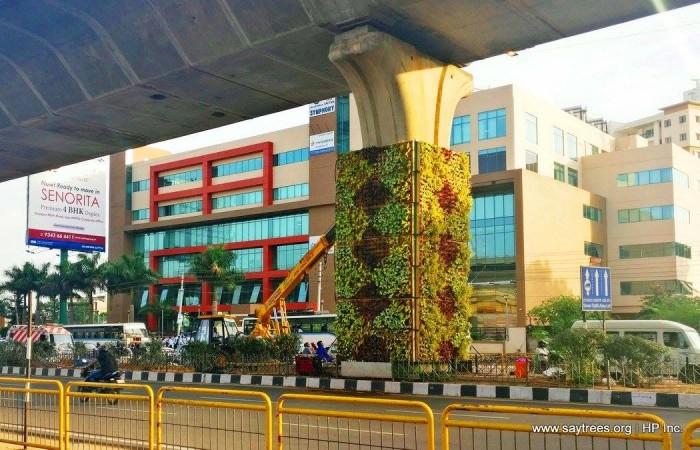
Bengaluru has become synonymous with traffic snarls and heavy air pollution. The city is home to several top IT companies of the world that it came to known as 'Silicon Valley of India' while shedding its vintage title 'garden city'.
Since the city is the most prospective place for wannabe techies, scores of fresh engineering graduates started settling in the Karnataka capital. With development making such rapid strides, air pollution too increased drastically.
In order to curb pollution and make Bangalore more greener, an NGO called Say Trees has successfully installed the second vertical garden with 4,200 saplings on one of the pillars of Electronic City expressway. Earlier, in March, the team had installed the first vertical garden after experimenting with almost 25 different plants to know which are capable enough to survive in the city's environmental conditions.
Speaking to International Business Times India, Durgesh Agrahari, the head of partnerships and projects of SayTrees, revealed that the team has made an organic vertical garden using coconut husk and soil, and instead of plastic containers, used coir boxes to hold the plants.
Also check out these 7 lesser-known weekend getaways from Bengaluru
When asked about the challenges they faced in installing the garden, he said: "We have to work right in the middle of the road and managing the heavy traffic is the biggest challenge." During the installation of the first vertical garden, the NGO had faced issues due to the uncivilised behaviour of the public, who are said to have stolen the saplings and motors used to pump water. "However, so far, no such problems have happened with the second pillar," he added.
The second vertical garden has been sponsored by the IT company HP, and Durgesh stated that an approximate cost for the installation of a garden would be around Rs 600 to Rs 750 per square feet.
"Not all plants are suitable for the extremely polluted areas. We consulted with horticulture experts regarding the same, and found a couple of species that are good in absorbing the atmospheric temperature and toxic. We use automatic drip irrigation system supported by a pump and timer that will water the saplings for five to six minutes every day and the coconut husk will absorb the water," he told IBTimes India.
When asked about the future plans of the NGO, Durgesh added: "The gardens will bring a good impact to the environment and make an aesthetic landscape. Electronic city expressway is almost 9 km long elevated highway with over 270 pillars, and as of now, it just have posters of politicians, movies or advertisements. We are evolving in terms of using new techniques and are working on different concepts with an aim to finish at least 25-30 pillars in 3 months time. It is for a social cause, so we hope to get help from corporate companies."
Earlier, the concept of a vertical garden was implemented by a start-up named Hydrobloom on the metro pillars of Namma Metro, Bengaluru getting inspiration from a similar initiative in Mexico City using the method hydroponics, which is organically growing plants without using soil and providing all the nutrients to the plants with adequate water supply.
With the completion of vertical gardens on one side of Bangalore, let's hope that the city will soon revive its name of 'Garden City of India'.
Here are the photos of vertical garden in Bengaluru:
2nd vertical garden,on flyover pillar,of 4200 saplings to serve Bengaluru. @PMOIndia @ndtv @abpnewstv @ZeeNews @nitin_gadkari @tatatrusts pic.twitter.com/yISBkxRx83
— SayTrees (@saytrees_ind) August 3, 2017
Here comes the 2nd Vertical Garden in Bangalore! 100% organic and eco friendly. @PMOIndia @moefcc @PrakashJavdekar pic.twitter.com/pdjXAftKqe
— SayTrees (@saytrees_ind) August 2, 2017
-














